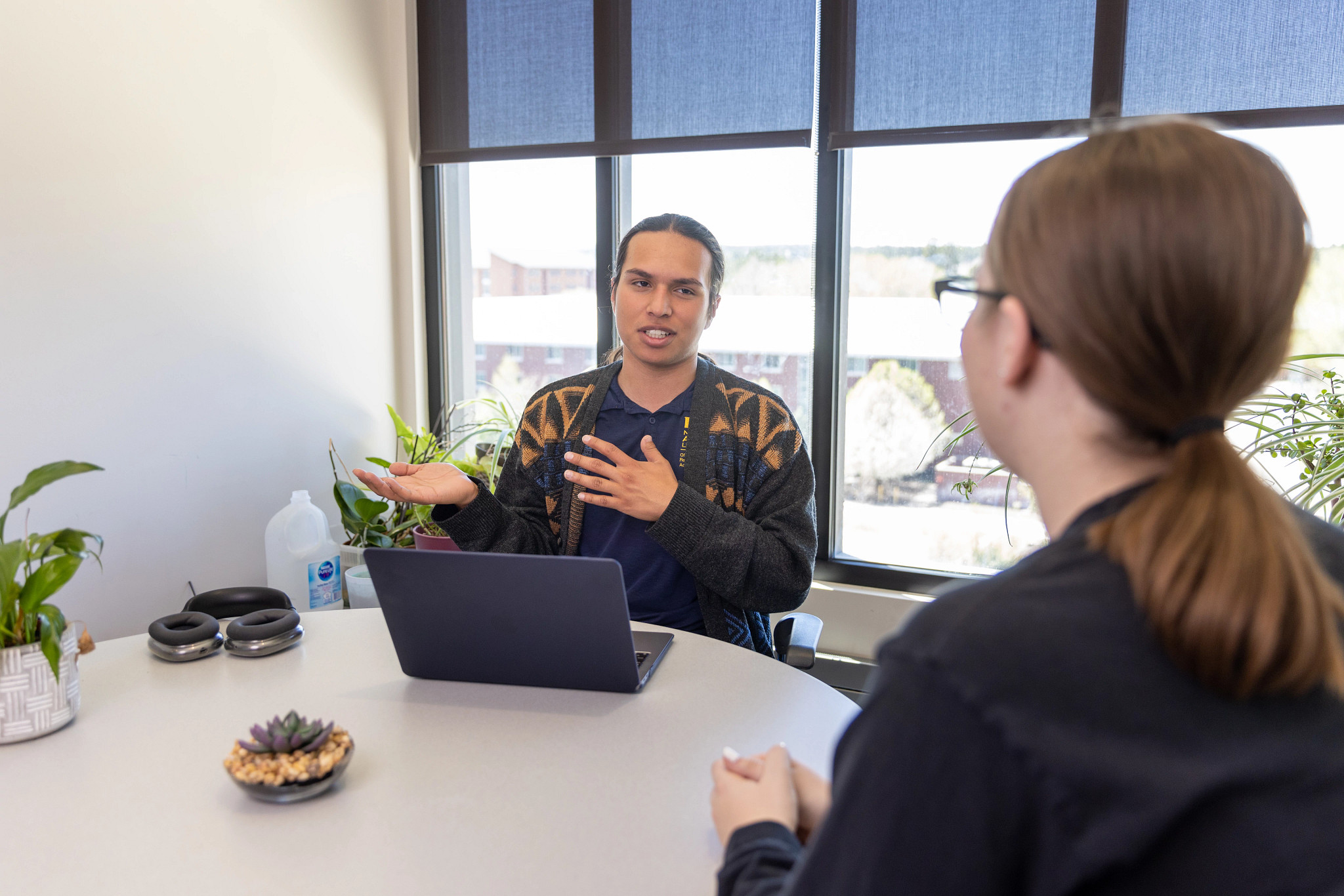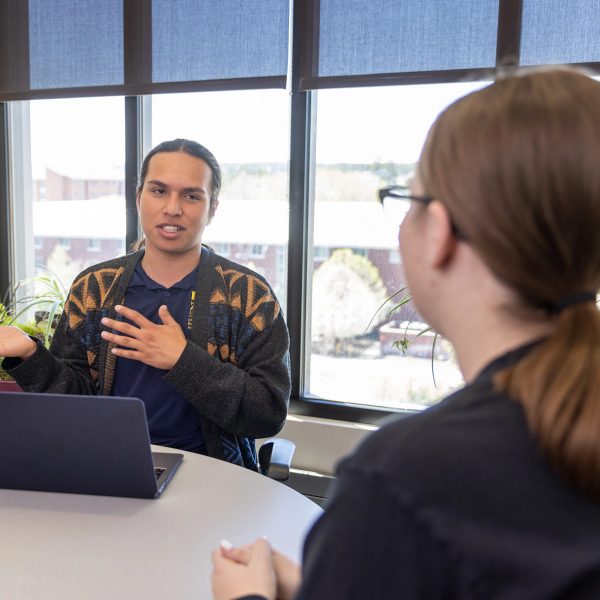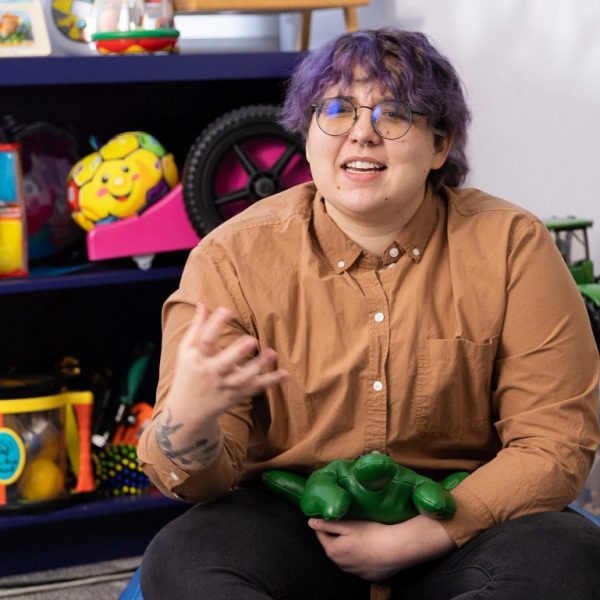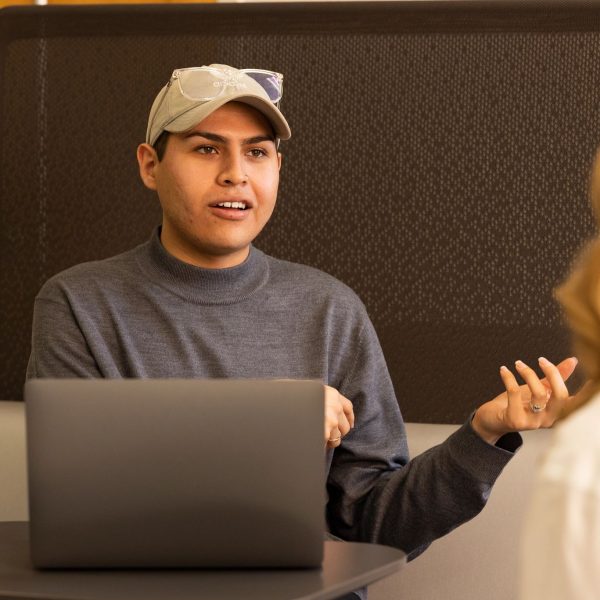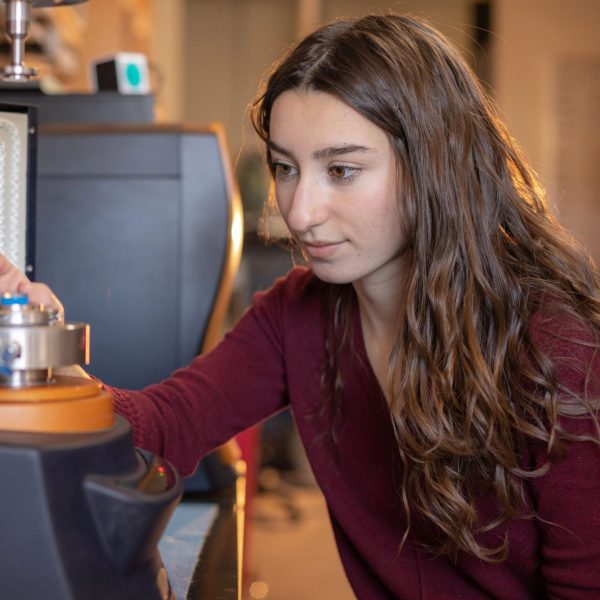Senior Miguel Rosas explores the undergraduate research process at NAU—its successes, potential improvements, and impact on students.
Undergraduate research has always been an important element of what NAU has to offer. Getting student feedback on the research process, and potentially improving components of it, is what drives Miguel Rosas. An Honors College double-major in Marketing and French, Rosas also works in the Office of Undergraduate Research and Creative Activity (OURCA) on campus as a student administration employee. Their work prompted them to look more closely at what students found rewarding—or not—about the process of undergraduate research, and to conduct their own research project with OURCA Assistant Director Tina Zecher. “Examining How Undergraduate Research Experiences Impact Students’ Perceived Growth Towards University Learning Outcomes” focuses on the Hooper Undergraduate Research Award (HURA) and its impact on NAU students.
“The HURA is one of many projects that we have in OURCA; it’s been running since 1999,” says Rosas. “Through HURA, students can apply for a year-long grant, and if they are accepted, get up to $5,000 to work on a project of their choosing as the principal investigator.” The program is unique to NAU.
HURA research award fosters career skills
HURA’s funding amounts are often significant in comparison to other sources. “I presented this data at Harvard’s National Collegiate Research Conference,” says Rosas, “and many undergraduate researchers from across the country were surprised at the low barrier to entry and the amount of support given for undergraduate research here at NAU. Some came from bigger universities and had to apply for grants of about $500, so being able to get up to $5,000 for research through HURA was a very big deal to them.”
Rosas found that undergraduate research makes a big impact on the student experience, and can also potentially influence the student’s future career. “The students who participate are more prepared when they enter the workforce or grad school. To have a little bit of research experience already under their belt—especially being the principal investigator as an undergraduate—can be a pretty big deal.”
While Rosas observed the benefits of undergraduate research, they wanted to better understand how students felt research had impacted their lives following the completion of their projects, and potentially how the process could be even better. “This project, for me, was a good way to get a feel of the impact of the work that I help do with students,” they say. “My job is to get NAU students to learn about our programs and make sure that people are aware of these opportunities available to them. Sometimes after we’ve helped recruit students, it’s a little bit difficult for me to see the impact that we’re having. Not only does it make me feel more passionate about my work, knowing what sort of impact I’m making, but also it helps me better understand where OURCA is lacking in our outreach, and where we can strengthen it moving forward.”
Assessing growth in target skills and learning outcomes
To measure feelings of student satisfaction, Rosas and Zecher constructed a skills assessment for previous undergraduate researchers. “We looked at data that we took from a pre- and post-assessment for students who participated in the program, and examined how they perceived their own growth in accordance with certain values that the university has outlined as desired learning outcomes. Those values include decision-making, diversity, problem-solving, communication, and self-awareness, which are all values that we think are important in research as well,” Rosas says.
Rosas is referring to the University Learning Outcomes, a list of goals and expectations that NAU graduates should be able to meet in order to meaningfully engage with and contribute to their communities. “We want to make sure that OURCA’s programs are not only benefiting students in the ways that we think are important, but also in line with what the university thinks is important,” Rosas shares.
The team applied statistical analysis to their data, finding that HURA has a positive impact on student learning outcomes—especially decision-making. “We wanted to see that students were feeling more and more comfortable with their skills, but with decision-making we saw a really large amount of growth, which makes sense. It’s the first time that they’re the principal investigator, so they’re the ones that have to go, ‘Okay, I need to make this budget cut,’ or, ‘I need to change the scope of the project,’” Rosas says.
There’s this notion that research is only for STEM majors, which isn’t necessarily true. Our office tries our best to give equal opportunity to students in the arts or studying English or other majors. There’s research that can be done in basically every field, and we want to encourage that.
Overall, the surveyed students who participated in undergraduate research took something positive from the experience, growing in both concrete skills and the confidence to use them. “By and large, research had a positive impact on all students, and that self-perception is something that we really value because it’s half of the battle, believing that you can do it,” Rosas says.
In the future, Rosas hopes to apply what they and Zecher learned to further improve the undergraduate research experience at NAU. “We’re looking at how we can apply this data to the program to improve it, and focusing our efforts more in the areas where we aren’t seeing as much growth as we’d like, rather than on an area where a lot of students are saying, ‘I feel that I’ve experienced significant growth here already,’” they say.
The conclusion of Rosas’ study—and their advice to students—is clear: try undergraduate research, even if you’re uncertain. You’ll likely be glad you did. “I think the first step to being able to succeed in research is believing that you’re able to do it. If you say, ‘I’m not cut out to do research,’ then you’re never going to know whether or not it’s for you,” Rosas says. “There’s this notion that research is only for STEM majors, which isn’t necessarily true. Our office tries our best to give equal opportunity to students in the arts or studying English or other majors. There’s research that can be done in basically every field, and we want to encourage that.”

